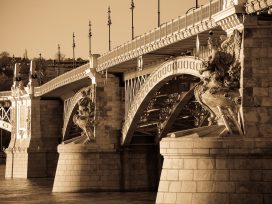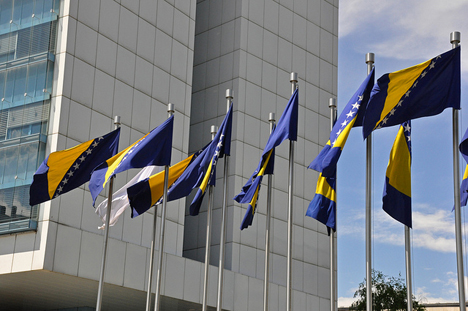
Overlapping crises, enforced political passivity, a new political normal: all things that gradually dismantle a democracy. Ferenc Laczó talks the death of democracy in a new episode of Gagarin.
At the beginning of February, violent protests swept through Bosnia-Herzegovina: demonstrators clashed with police and government buildings were set ablaze. But then, independent citizens’ assemblies began to be organized to formulate demands to be made to the government.
Recent unrest in Bosnia has exposed the age-old dilemma about democracy once again: is democracy procedural or substantive? In other words, are certain procedures required in order to uphold basic democratic standards, such as political equality, freedom of speech and free elections, sufficient for democracy? Does it matter what kind of outcomes result from democratic procedures? Is democracy a matter of a particular way of doing politics, or a matter of the specific content of democratic decision-making?
As political philosophers like to stress, mere procedures do not make democracy. Decisions made by democratically elected governments will be legitimate only if they reflect certain principles that derive from democracy’s conceptual content. However, a procedural understanding of democracy is often taken as the dominant standard of value judgments and political assessments. It is often easier to look at institutional procedures than to judge the character of their outcomes, which are often ambiguous or complex. But, is this a good way of making judgments about democracy? Looking through this lens at recent events in Bosnia may provide an answer.

Flags of Bosnia and Herzegovina flying before the parliamentary offices in Sarajevo. Photo: Jennifer Boyer. Source: Flickr
By procedural standards, Bosnia and Herzegovina is a democratic country. Its institutions are populated through free elections; there is freedom of speech, and the citizens are nominally equal to one another. There is no visible violence of institutions towards the citizens, few (if any) political prisoners, and most of the citizens are free to live their life the way they see fit. The biggest procedural problem of Bosnian democracy is the exclusion of minority citizens from political representation: groups other than the three main ethnicities (Bosniaks, Croats and Serbs), such as Jews and Roma, cannot have their representatives in the institutions. After the European Court of Human Rights ruling of 2009 to the effect that Bosnian institutions need to rectify this violation of human rights, the politicians have been in constant, yet so far unsuccessful, negotiations about changing this procedural provision. 1
However, the content of Bosnia’s democracy is deeply problematic: the political elite is corrupt and unaccountable;2 elected representatives do not care about the needs of the citizens; there are striking levels of inequality,3 mainly caused by poor public policies and the gigantic bureaucratic apparatus; the outcomes of political procedures are unfair – they usually benefit small groups of politicians and their friends and not the population at large.
The lack of substantive democracy is what has brought protesters in many Bosnian cities into the street over the last weeks.4 They did not object to the way Bosnian democracy is procedurally executed, but the way the decisions are made by elected representatives. They wanted more fairness and social justice; they wanted better democratic outcomes.
One may still ask, however, why did they choose to hit the streets instead of polling stations; the general elections are around the corner, in October this year? The answer to that question is simple. Namely, Bosnian procedural democracy depends on the prevalence of ethnic nationalism. Main political parties ride on the ethnic sentiment of the majority of the populace and win votes through scare tactics and the exploitation of wartime memories and antagonistic narratives.
Instead of substantive issues of public policy, election campaigns focus on the power struggle between three competing ethno-nationalisms. The result of every election since the country gained its independence in the early nineties was the same: the rule of ethnic parties and the predominance of ethnic categories of political practice. Even the non-ethnic parties, such as SDP, very often succumb to the lure of ethnicity. The distribution of institutional power between ethnic groups is the main concern in Bosnian politics.
Bosnian citizens who wanted change did not have any other option but to go out to the streets and ask for better contents of democracy because the procedures did not allow them to shift the nature of political discourse to any other issue. In a system saturated with ethnic categories, in which elected representatives are unaccountable to those who have elected them, there is no other way to express concern and struggle for equality, justice and fairness. There are no platforms for debates about accountable (and non-ethnic) policy-making.
On the other hand, substantive democracy alone, as many political scientists know, is not sufficient either. One cannot bring about democracy through non-democratic means. Procedures also matter.
The initial thrust of Bosnian protests tilted towards violence: several buildings were burned, including the seats of regional (cantonal) governments in the cities of Tuzla and Sarajevo. While not justified (and clearly non-democratic), the violence of Bosnian youth against government institutions is comprehensible: systematically neglected, exploited and poorly educated masses lack other means of political expression. The fault was theirs, but only indirectly. Fire was their only voice at that moment. The passion for democracy’s contents took them in the wrong direction.
But, what is particularly interesting about the protests is the reaction from the local and international political elites. For the first time in twenty years, afraid for their positions of power, local politicians resorted to amazingly colourful demagogy aimed at discrediting citizens’ claims on the basis of variety of assumptions.
Bosniak political elites claimed that the protests were orchestrated by Serbs to destabilize the country and bring about the secession of the Serb entity; Serb and Croat elites claimed protests were organized by Bosniaks to destroy the federal organization of the country and make it unitary; all of them together claimed that protesters have no legitimacy to demand changes in government, since they are the sole democratically elected representatives of all citizens, and not just a handful of angry hooligans who set fire to government buildings.
Not surprisingly, the representatives of the international community and the neighbouring countries, showed cold disdain for the citizens’ demands and decided to uphold the values of strict democratic proceduralism. Croatian Prime Minister Zoran Milanovic visited the town of Mostar (the stronghold of Croat ethnic nationalism) and expressed support to the existing political establishment.”5 The High Representative of the international community, Austrian diplomat Valentin Inzko even went so far as to warn the citizens that if unrest continues, EU military forces could arrive in Bosnia to maintain peace.6 There was not a single expression of sympathy with the demands of Bosnian citizens for substantive values of democracy: only empty praise for democratic proceduralism and a perfunctory acceptance of the freedom to protest.
The perils of procedural democracy are not only a characteristic of contemporary Bosnia. Many other countries and political associations face the same problem. The lack of substantive democracy has been bringing citizens onto the streets throughout the European Union, the Middle East, and even United States for many years now.
The rising popular unrest everywhere clearly indicates the problem of a minimalist and procedural understanding of democracy and points to the need to rethink the consequences of democratic decision-making. What kinds of consequences are sufficient to justify the democratic nature of political institutions? How can we accommodate the procedural and substantive requirements of democracy? These are questions not only for Bosnians, but also for democrats everywhere.
Finding answers to these questions is difficult. This is a task for political theorists as well as for political practitioners, since every context will be specific and will demand unique solutions. But, it is safe to say that democracy cannot, and should not, be understood in an exclusive way: both procedures and the content matter.
This is important if we wish to use democracy as a standard for making value judgments about different social movements and events that take place in the world, from Bosnia to Ukraine.
As for Bosnians on the streets, they have taken a step forward in trying to bring the two dimensions of democracy together. After the initial incidents leading to violence and demolition of government buildings, they have consolidated themselves, refrained from further violence and started organizing independent citizens’ assemblies that will serve as forums for public deliberation and formulation of substantive demands to be made to the government.7
With a due respect for the democratic procedures that have brought the existing political elite to power, they will try to contribute to the development of Bosnia’s democracy by offering ideas about the content of democratic governance that should advance social justice and bring more fairness to Bosnian society.
By organizing assemblies at local levels, citizens are aiming to go beyond entrenched ethnic categories and change the nature of political discourse in the country. The main questions now are not ethnic but social. They do not ask for a better or different ethnic representation in state institutions: they ask for better social outcomes of functioning institutions. Better social standards and services, more fairness and accountability.
The solutions will take some time to emerge. Democracy is a messy process, not a set of clear-cut measures that can take effect immediately. The recent protest is one of the best learning exercises for the young Bosnian democracy. What we all should do is help Bosnians learn the lesson at their own pace and try not to hamper them by insisting that democracy is only about procedures and not about outcomes. We may be surprised to see them find answers that we all can learn from.
Eastern approaches blog, "The Sejdic-Finci question", , 9 October 2013, www.economist.com/blogs/easternapproaches/2013/10/bosnia
Marie Chène, "Corruption and Anti-Corruption in Bosnia and Herzegovina (BiH)", The U4 Anti-Corruption Resource Centre, 23 November 2009, www.u4.no/publications/corruption-and-anti-corruption-in-bosnia-and-herzegovina-bih/
Marcelo Bisogno and Alberto Chong, "Poverty and inequality in Bosnia and Herzegovina after the civil war", World Development 30, no. 1 (2002): 61-75
Tim Judah, "Bosnian protests: A Balkan Spring?", BBC News, 7 February 2014, www.bbc.co.uk/news/world-europe-26093160; see also the Bosnia-Herzegovina protest files, bhprotestfiles.wordpress.com
Croatian PM visits Mostar to support efforts to calm situation", Government of the Republic of Croatia, 9 February 2014, www.vlada.hr/en/naslovnica/novosti_i_najave/2014/veljaca/croatian_pm_visits_mostar_to_support_efforts_to_calm_situation
Guy Delauney, "Bosnia unrest: Bruised and bitter in Sarajevo", BBC News, 10 February 2014, www.bbc.co.uk/news/world-europe-26113510
Published 21 February 2014
Original in English
First published by Can Europe make it? / openDemocracy, 18 February 2014
Contributed by openDemocracy © Eldar Sarajlic / openDemocracy / Eurozine
PDF/PRINTSubscribe to know what’s worth thinking about.

Overlapping crises, enforced political passivity, a new political normal: all things that gradually dismantle a democracy. Ferenc Laczó talks the death of democracy in a new episode of Gagarin.

The original assembly in 12th century Spain was not a space for popular democracy, but for tough bargaining and long distance government. After 800 years of evolution and facing civilizational challenges, parliaments need to further transform to meet the moment and deliver on the promise of inclusion. Can watchdog parliaments gather enough steam to effectively restrain those in power?